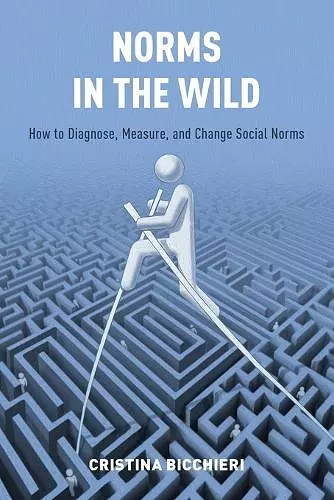Norms in the Wild
How to Diagnose, Measure, and Change Social Norms
Format:Paperback
Publisher:Oxford University Press Inc
Published:9th Feb '17
Currently unavailable, and unfortunately no date known when it will be back
This paperback is available in another edition too:
- Hardback£137.50(9780190622046)

In Norms in the Wild, distinguished philosopher Cristina Bicchieri argues that when it comes to human behavior, social scientists place too much stress on rational deliberation. In fact, she says, many choices occur without much deliberation at all. Two people passing in a corridor automatically negotiate their shared space; cars at an intersection obey traffic signals; we choose clothing based on our instincts for what is considered appropriate. Bicchieri's theory of social norms accounts for these automatic components of coordination, where individuals react automatically to cues that focus their attention on what the norm is in that situation. Social norms thus act as rules for making choices in a social world where people expect others -- often unconsciously -- to follow the same rule. Some norms enable seamless social co-operation, while others are less beneficial to human flourishing. Bicchieri is famous for her interdisciplinary work on game theory and most recently her work on social norms, and Norms in the Wild represents her latest challenge to many of the fundamental assumptions of the social sciences. Bicchieri's work has broad implications not only for understanding human behavior, but for changing it for better outcomes. People have a strongly conditioned preference for following social norms, but that also means that manipulating their expectations can cause major behavioral changes. Bicchieri has been working recently with UNICEF and other NGO's to explore the applicability of her views to issues of human rights around the world. Is it possible to change social expectations around forced marriage, genital mutilations, and public health practices like vaccinations and sanitation? If so, how? What tools might we use? This short book explores how social norms work, and how changing them - changing preferences, beliefs, and especially social expectations - can potentially improve lives all around the world. It will appeal to an unusually broad range of readers including philosophers, psychologists and others in behavioral sciences, and anyone involved in public policy or at NGOs.
Cristina Bicchieri (2006) advanced a powerful and well-received account of norms. Her work reflects important ways in which philosophical and social scientific reflection on norms can be joined to great advantage. In its empirical richness, her work goes beyond the also important work of Philip Pettit (1990) and by Brennan, Eriksson, Goodin, and Southwood (2013). Bicchieri understands various kinds of norms as rules for which agents have a conditional preference to conform. Such preferences are keyed to various expectations--empirical expectations and normative expectations...This is a fascinating and informative read--one rich in its appreciation for complexities and grounded in concrete engagement with such complexities. * David Henderson, Notre Dame Philosophical Reviews *
'Philosophy isn't useful for changing the world,' parents of philosophy students and Karl Marx tell us (at least about non-Marxist philosophy). Cristina Bicchieri's new book Norms in the Wild provides an impressive antidote against this worry...To sum up, this is a fascinating book, and everyone interested in social norms and social change should read it. * Ulf Hlobil, Metascience *
ISBN: 9780190622053
Dimensions: 206mm x 140mm x 18mm
Weight: 295g
264 pages